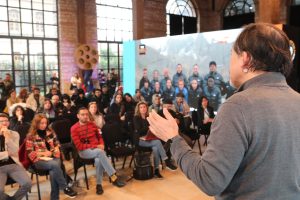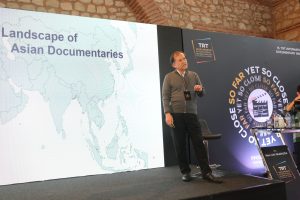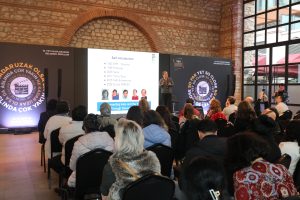Workshop: Pitch Perfect – Mastering the Art of Persuasion
Documentary producer Ken-ichi Imamura met with producers, directors, and both industry professionals and amateurs interested in documentary filmmaking as part of the TRT International Documentary Awards.
Speaking at the Pitch Perfect: Mastering the Art of Persuasion workshop and the panel “Exploring Global Markets: Strategies for Co-productions in Asia and Beyond,” Imamura emphasized that the TRT International Documentary Awards and similar events serve as important gateways for co-production in documentary projects. However, he noted that co-production platforms alone are not enough to bring a documentary project to fruition, stating:
“Filmmakers who attend such events gain a better understanding of industry dynamics beyond Turkey. Meeting international filmmakers is crucial. But this is just the first step in the co-production process. Producers need to be aware that they have a long journey ahead. Co-production requires time and perseverance. Success cannot be achieved by merely attending an event. These gatherings are invaluable for networking, and participation is a critical starting point.”
Documentaries and the Truth
Imamura stressed the vital role documentaries play in revealing truth, saying:
“Documentaries are human-made works that connect deeply with people. The relationship between filmmakers and the individuals featured is extremely important. At this stage, we don’t need AI technology during production. Of course, AI can be used in editing or post-production, but it is not necessary when working with subjects in the documentary process.”
He noted the persistence of conflicts worldwide and explained documentaries’ essential role in conveying truth:
“Wars represent conflict between two sides, but documentaries help us understand what war really means. While it’s challenging to fully present both sides’ perspectives in a documentary, it is still possible to approach this balance. When we watch a Palestinian filmmaker’s documentary about Palestine, we grasp their viewpoint; when we watch an Israeli filmmaker’s work, we see theirs. This allows us to form a judgment about right and wrong. It’s important to learn the facts on the ground, even at a basic level, because most of us cannot travel to Israel or Palestine. Documentaries provide a vital window to the reality of these events.”
Opportunities from Events Like TRT Awards
Imamura shared that Tokyo Docs has collaborated with filmmakers from many Asian countries including South Korea, China, Indonesia, Malaysia, Bhutan, and Myanmar, but that he has yet to work with Turkish filmmakers. He remarked:
“Turkey offers strong and compelling documentary themes. I have spoken with Turkish filmmakers whose projects were truly interesting, but they need to develop these ideas further to resonate with audiences outside Turkey.”
At the TRT International Documentary Awards, Imamura had the opportunity to exchange ideas and meet documentary filmmakers. He added:
“Filmmakers can learn new methods by engaging with peers from other countries. Watching foreign documentaries reveals different production approaches. Events like this provide a significant opportunity to start something new.”
Pitch as the Art of Persuasion
In today’s world, the ability to generate ideas is as important as effectively communicating them at the right time to the right audience. Japanese documentary filmmaker and presentation expert Ken-ichi Imamura shares the narrative skills he has refined over years working with NHK World and international collaborations in this comprehensive masterclass.
Imamura views the “pitch” not just as a presentation technique but as a bridge connecting an idea to a person—a bond of trust and a form of aesthetic expression. A pitch is not merely about persuasion but about creating a genuine connection. Therefore, a pitch should convey the core of the idea sincerely rather than just the speaker’s voice. In his approach, pitch is rooted in storytelling, emotional resonance, and clarifying the narrative instead of simply delivering information.
The Anatomy of a Pitch and Practical Methods
“The identity of an idea lies in how it is told.” – Ken-ichi Imamura
The fundamental elements of pitch art include:
- Hook: The first 15 seconds to captivate potential supporters using questions, metaphors, or striking statistics.
- Problem – Solution: What problem does the project address? What unique perspective does it offer?
- Heart of the Idea: Can you summarize the project in a single sentence?
- Tone and Form: What is the aesthetic style—fictional, experimental, observational?
- Audience and Dissemination: Who is the target audience and how will the project reach them?
Imamura’s method blends Japanese narrative traditions with Western visual storytelling. The masterclass discusses the use of silence, rhythm, precise word choice, and body language.
Practical modules include:
- Condensing an idea into a single sentence
- Examples of 90-second video pitches
- On-camera presentation techniques
- Simulated international jury sessions
Cultural Context, Global Impact, and Conclusion
Imamura approaches pitching as a form of cultural representation, exploring questions such as:
- Why must this story be told now?
- What message does the subject want to send to the world?
- What is the cultural context and emotional depth of this idea?
Tips for Global Pitches:
- Translating local stories into universal themes
- Clarifying the project’s visual and auditory identity
- Building emotional connections with juries and funding bodies
About Ken-ichi Imamura
Ken-ichi Imamura is a leading international figure in documentary filmmaking. He began his producing career at NHK, Japan’s public broadcaster, in 1983. From 2009 to 2012, he served as editor-in-chief of the World Documentary program, and since 2012 has focused on co-productions and pre-acquisition projects at NHK Enterprises.
He co-founded Tokyo Docs in 2011, a platform dedicated to showcasing Asian documentary filmmakers internationally, supporting numerous productions across the region.
Imamura’s award-winning works include Planet of Snail, The Chinese Mayor, and Kabul, City in the Wind, which address social and cultural issues with compelling storytelling.




